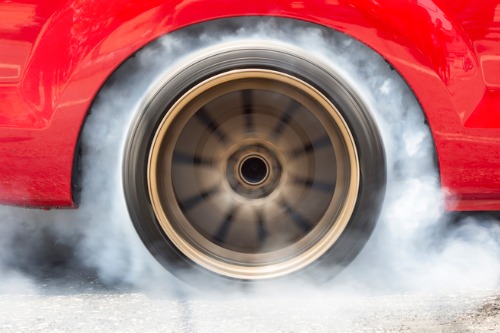

There’s something thrilling about a burn out competition. It’s that almost animalistic desire to push something to its extreme, while making noise, smoke and commotion in the process. It’s great fun for spectators and is a popular summer event across Canada.
A burn out competition is when drivers are given a set amount of time to shred their tires on a compounded surface. The driver who emits the most smoke from their tires, wins. Sounds fun, right? But as an insurance broker, what if one of your clients suddenly announces they’re throwing a burn out event? Is this a risk insurers are willing to take on?
Burn out competitions have been popular across Canada for a number of summers, according to Jill Edney, commercial lines underwriter at Angus-Miller Insurance. During an educational seminar at the Atlantic Insurance Brokers Convention (AIBC) in Moncton, she said: “These events caught on quickly and really became the thing to do. The problem with that is that most people who were putting on burn out events had no idea of the logistics behind it, or of the potential for bodily injury to people either participating or spectating.
“When brokers send submissions for special events like this to underwriters, the questions on our applications may seem excessive, but we really want to make sure that your client is aware of what they’re doing and aware of the type of injury that can be caused to participants and spectators.”
Special event insurance is a policy designed to provide protection for situations in which an event holder must defend themselves against damages for bodily injury or property damage to third parties. It can be something as simple as an anniversary party in a church basement or a wedding in a local park, or it could be a bigger event like a road race, a parade, or a burn out competition.
Some typical hazards for special events include slips and falls, fights between patrons, stage or barrier collapses, and guest intoxication. Liquor liability is a large concern at special events, even for small parties thrown in a local town hall. Edney explained that underwriters will always ask whether liquor will be served. If it is, they’ll ask whether that liquor is being served by a third-party and if that vendor has proof of insurance.
Read more: What is liquor liability insurance?
Edney has seen some interesting special event submissions during her 34-years of experience in the insurance industry, including a History Channel-esque Knight Fight event, where adults got dressed up in suits of armour and fought each other.
She told the audience: “A couple of years ago, I was asked to quote on a cycling road race. The questions I asked included: Will you have food and aid stations on site? Will there be First Aid and paramedics available? Are waivers signed by all participants? Are there going to be road closures? Now, road closure is a big one. I’ve been in running road races before where volunteers were responsible for the road closures. There were a couple of instances where a volunteer unknowingly let a vehicle through the barricades and the vehicle actually struck one of the participants. So, underwriters will ask who is responsible for the road closures – is it the local police or is it volunteers? It’s on the client if one of the participants gets hit.
“Another cool event submission I had was for snowmobile racing at Poley Mountain, NB. It was basically a drag race where snowmobiles raced up the mountain. One of the questions we would ask on that submission is: How are the spectators protected from injury if a snowmobile loses control? We’d also want to know about security, bouncers and crowd control depending on the event. Underwriters’ questions are always tailored toward the type of event that your client is putting on.”
One extra tip Edney had for brokers with special event submissions was that they ensure their clients are aware of any provincial regulations or by-laws that must be followed in order to host the event. For example, with burn out competitions, they should check whether the compound the event organizer is using to smoke the tires is something that requires pollution liability coverage. It’s important for brokers to cover all bases.
